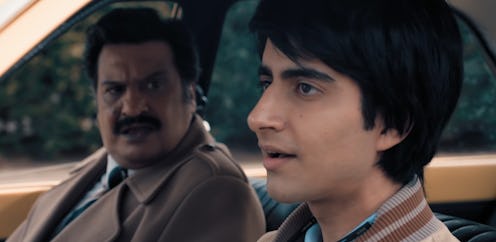Entertainment
‘Blinded By The Light’ Shows Why Daytime Raves Were So Important To British Asian Teens
Blinded by the Light will speak to anyone who has ever felt like an outsider, been aware of their differentness, wanted to flee the place they came from, or who is simply a fan of Bruce Springsteen's music. But, there is one aspect of the film that will probably only be familiar to British Asian kids of the '80s or '90s or anyone who had a connection to that culture at that time. Blinded by the Light features a daytimer party, and it's a beautiful look at a real event that meant a lot to young Asians in Britain during the era. Mild spoilers ahead.
In the movie, the lead character, Javed (Viveik Kalra), attends a daytimer party for the first time with his sister, Shazia (Nikita Mehta), who is a regular. Javed is shocked to find that Shazia and all the other attendees enter in their school uniforms, and quickly change into the trendiest fashions of 1987. As Shazia explains, the point of the party is for kids with strict parents to skip school and go dancing during the day, because they're not allowed to go out at night. Earlier in the film, Javed isn't even allowed to go to a party at his best friend's house, and he only lives a couple of doors down.
Blinded by the Light is based on the memoir Greetings from Bury Park by Sarfraz Manzoor. The film shows Javed wanting to become a writer, and that's just what Manzoor did in real life. (He co-wrote Blinded by the Light, too.) In 2012, Manzoor wrote about daytimers for The Guardian in an article titled, "Strictly bhangra: how daytimers got young British Asians dancing".
"It was the era of the nightclub, a time when dance music took hold in the UK. But the young British Asians who came of age during the 1980s and 1990s had, on the whole, conservative parents who disapproved of their children going to sweaty nightclubs, getting drunk and hooking up with the opposite sex," Manzoor writes. "Against this repressive backdrop, something new emerged that passed largely unnoticed by the mainstream: club events where thousands of young Asians would listen to music — bhangra mainly — performed by bands and later played by DJs. These events took place not at night but during the afternoon, when those kids were thought to be at college, school or the library."
The events would sometimes be attended by as many as a couple thousand people. One former partier, Rav, told Manzoor, "You'd tell your parents you were staying late at school. Then you'd walk out with your uniform on, jump on a bus, pay £10, have a rave, and be home for 6:00 p.m."
Earlier this year, the BBC shared pictures from photographer Tim Smith, who documented daytimer parties. One of the organizers, Moey Hassan, spoke to the BBC for the story and explained, "We would kick off at midday and they would party till 4:00 p.m. and then go home for tea, pretending they had had a good day at college."
The director of Blinded by the Light was also involved in daytimer parties when she was growing up. "Then the whole Bhangra 'daytimer' scene was very much my world and that was something that was very important to me in 1987," Gurinder Chadha told Yahoo!. "I went to a club called Equinox, in Leicester Square, so that was a big year for me and the Bhangra scene because it made me who I am."
In Blinded by the Light, Javed really connects with Springsteen's music because he wants to leave his hometown behind and is watching his working class family struggle. He also always feels like an outsider being Pakistani and facing racism daily. But, in the scene where he attends the daytimer party, Javed finds a new appreciation for his own culture. He sees that south Asian kids can feel free and party without rejecting their own heritage. And, thanks to his Walkman, he mixes a little Springsteen in for his own curated experience.
